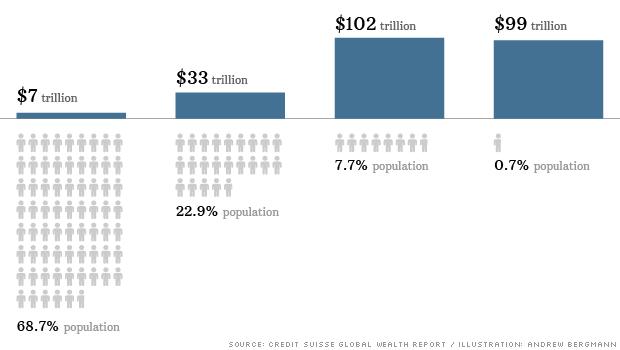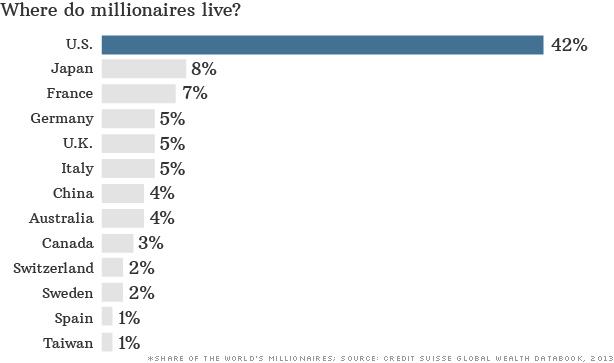What else can we expect : from $1 billion bets ("because it will be most fun") to hypocritical "discussion of world problems" - what else can we expect from a people that think that raising salaries to their workers is an ultimate sin. Nothing new in the perfect new world
Wealth: A few control almost all of it
The richest people in the world are very, very rich.
The fat cats at the top control nearly all the world's wealth, according a report from Oxfam, an anti-poverty group.
The bottom two-thirds, meanwhile, own just a tiny sliver.

Oxfam released the report ahead of the World Economic Forum, which called widening income inequality one of the greatest worldwide risks in the next 12 to 18 months.
Pope Francis called on global leaders gathering at the Forum's annual meeting in Davos, Switzerland, to do more to help the poor.
"I ask you to ensure humanity is served by wealth and not ruled by it," the pope said.
Many of the richest on Earth live in the United States, which has the largest share of the world's millionaires.

In many countries, the rich are only getting richer. They are capturing an ever-growing share of the nation's income, especially in places such as the United States and Australia.
The “R” word becomes taboo for global elite
Spare a thought for the business and financial elite as they slide along the icy byways of the World Economic Forum in Davos. Life is undeniably picking up for them and it would be nice to say so. But the economic recovery has its winners and losers, and it looks bad to be a beneficiary at a conference whose overarching theme is “inclusive growth.”
Most of the chief executives, bankers and politicoes gathered at the WEF are, at best, only mildly optimistic in public. From panel to podium, many delegates acknowledge there’s more to cheer about than last year. A G2 comprising the United States and China is leading global growth. A slowdown in emerging markets – even the implosion of an Argentinian peso or Turkish lira – won’t change that.
On the sidelines, WEFers are much more positive. There’s talk of boosting productivity by making investments instead of opting for crude job cuts. January’s M&A boomlet could become self-perpetuating. In the words of one senior Wall Street banker, executives are “looking for validation of what the markets are telling them.” They are being told what they want to hear. Business hasn’t felt this good since before the crisis.
But to say openly that things are better than that would be unseemly. It takes the chutzpah of a Jamie Dimon, the outspoken chief of JPMorgan, to say “the moon, stars and sun may be aligned” for better times.
This year’s WEF has rightly preoccupied itself with the quality rather than the pace of the recovery. The image of out-of-work 20-something graduates in Madrid or Minneapolis haunt the forum. They are at risk of being seen as unemployable if they are out of the labour market for more than a couple of years. Quick fixes are elusive. As Eni Chairman Giuseppe Recchi remarked, it is “difficult for a company to hire a 30-year-old without work experience.”
One idea is for carefully designed, large-scale internship programmes. That, like many aspects of business behaviour that would support an inclusive recovery, involves short-term cost. Yet the investment community judges executives on short-term financial performance. PepsiCo chairman and CEO Indra Nooyi said in a session on “Doing Business the Right Way,” people may be forced to choose between “a pension return that’s high or a job.”
Sociological embarrassment isn’t the only cause of reticence. To call the turn exposes delegates to the possibility of having to eat the words when the next crisis blows. Lim Siong Guan, the president of the Government of Singapore Investment Corp, puts it bluntly: “They don’t want to declare it in case they are wrong.”
All of which explains why it may be safer to play up the risk that, say, this year’s European bank stress tests reveal some ugly truths that are too hard for the system to bear. Or that eurosceptics gain enough ground in forthcoming elections to disrupt European reforms. Or that Congress will gamble with U.S. creditworthiness in debt-ceiling negotiations. Or to dwell on Japanese Prime Minister Shinzo Abe’s warnings against increased Asian militarisation.
Davos Person has been lamenting the unfair state of the world at this exclusive forum. They can go home and enjoy an exclusive recovery.
Davos: 1 per cent vs 99 per cent, wealth inequality in numbers
From the $250 Bill Gates earns every second to Warren Buffett's net worth topping Cambodia and Jamaica's combined GDP, The Telegraph looks at how the gap between the 1 per cent and 99 per cent is growing
More than half the world's wealth will be owned by just one per cent of the population by next year as global inequality soars, anti-poverty charity Oxfam said today.
In a report released ahead of this week's annual meeting of the international elite at Davos in Switzerland, Oxfam said the top tier had seen their share of wealth increase from 44 per cent in 2009 to 48 per cent in 2014.
On current trends, it will exceed 50 per cent in 2016.
The charity's executive director, Winnie Byanyima, who is co-chairing the World Economic Forum meeting in Davos, said an explosion in inequality was holding back the fight against poverty.
"Do we really want to live in a world where the one percent own more than the rest of us combined?" she said on Monday.
"Business as usual for the elite isn't a cost free option. Failure to tackle inequality will set the fight against poverty back decades. The poor are hurt twice by rising inequality -- they get a smaller share of the economic pie and because extreme inequality hurts growth, there is less pie to be shared around."
The richest 80 individuals in the world had the same wealth as the poorest 50 per cent of the entire population, some 3.5 billion people.
Oxfam said it would call for action to tackle rising inequality at the Davos meeting, which starts on Wednesday, including a crackdown on tax dodging by corporations and progress towards a global deal on climate change.
The richest 80 individuals in the world had the same wealth as the poorest 50 per cent of the entire population, some 3.5 billion people. This was an even bigger concentration at the top than a year ago, when half the world's wealth was in the hands of 85 of the ultra rich.
Oxfam used data from the Credit Suisse Global Wealth Datebook, 2013 and 2014, and the Forbes' billionaires list to compile its research.
- Free trading apps
- Over 8,000 signals for copying
- Economic news for exploring financial markets
You agree to website policy and terms of use
The theme of this year's Davos meeting where the world's wealthiest and most powerful people meet to enjoy each other's company, a fawning media, and of course the best food and entertainment that money can buy, is social stability, class hatred, and how to fix a world torn by a record wealth inequality.
An ambitious task to be sure, especially for the very people who have benefited the most from the record wealth transfer of the past 5 years. Still, while these true Robin Hoods of the modern gilded age are desperate for a few minutes of humanitarian TV exposure, or at least a soundbite or two, their advice to the peasants out there is quite clear: don't get too close.
And just to make sure the appropriate distance of at least a few hundred meters to every member of the great unwashed class they are "saving" is maintained, here is the hotel in which the bleeding heart Davos billionaires are staying: a $170 million fortress surrounded by barbed wire, security cameras, motion sensor and even its own helipad.
Oh, and for those dignitaries of the non-private sector staying here, guess who is picking up the bill dear taxpayers.
read more